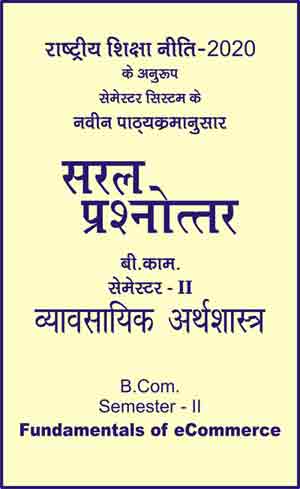|
बी काम - एम काम >> बीकाम सेमेस्टर-2 फण्डामेन्टल्स आफ ई-कामर्स बीकाम सेमेस्टर-2 फण्डामेन्टल्स आफ ई-कामर्ससरल प्रश्नोत्तर समूह
|
5 पाठक हैं |
||||||
बीकाम सेमेस्टर-2 फण्डामेन्टल्स आफ ई-कामर्स - सरल प्रश्नोत्तर
Question- What are the Benefits of E-governance?
Ans.
Benefits of e-governance
The objective of e-governance is to support and simplify governance for government, citizens and businesses. The use of ICT connects all parties and supports processes and activities. Other objectives are to make government administration more transparent, speedy and accountable while addressing the society's needs and expectations through efficient public services and effective interaction between the people, businesses and government. Following are the benefits of e-governance -
1. Access to Government Information and Services 24/7 : E- Governance involves access to government information and services 24/7 in a way that is focused on the needs of the citizens. It relies heavily on the effective use of Internet and other technology to receive and deliver information and services easily, quickly, efficiently and inexpensively.
2. Simplifies Processes : E-governance simplifies processes and makes access to government information easier. The other anticipated benefits of e-governance include efficiency in services, improvement in delivery, standardization better accessibility and more transparency and accountability.
3. Online Operations and File Movements : Technological advancements and increased pressure from citizenry have prompted improvements in governance areas. Administrative departments are computerised and connected through network. Software has been built and designed around government departments ensuring efficiency in operations. The departments have launched individual websites carrying information of their respective departments. This has enabled online carrying of operations and file movements.
4. Improvement in Quality of Government Services : Volumes of transactions and information are electronically handled and delivered over a wider area through the net and web, qualitative services become possible in least time, in least cost, in greater easily and in greater convenience. E- governance renders services to the citizens with greater accountability, responsiveness and sensitivity. Quality of services improves, as now the people get services efficiently and instantaneously.
5. Inducement in Norms and Values of Accountability Responsibility, etc. : With e-governance, Public actions coming under public glare induce norms and values of accountability, openness, integrity, fairness, equity, responsibility and justice in the administrative culture. Rather, administration has become more efficient and responsive.
6. Increased Efficiency : Accounting, data flow, etc. have become easy. This has increased the efficiency of office operations and processes and has reduced delays.
7. Emergence of less Paper office : Less paper office situation means an office situation where all the information (file and mail) amongst various functionaries is distributed online. Less paper office is the implementation of effective electronic communication processes that enable elimination of unnecessary papers. The concept is where files and mails are transmitted over wires to small computers at each employees's desk. Office work, such as, file movements, notings etc. is computerised and documentation, report preparation, databases are maintained in computers.
Due to interconnectivity through LAN, transfer of information and files take place online, thus reducing the physical movements and consumption and storage of huge piles of paper. Paperwork is reduced to a greater extent with communication being enabled via electronic route and storage and retrieval of information in the electronic form. All this has led to emergence of 'less paper office'.
Now, it can be concluded that-
ICT helps make the information available online,
When the governing process is made transparent, the government is automatically made accountable. Accountability is answerability of the government to the people.
Technology makes communication speedier,
Use of ICT makes governing process transparent,
Public expenditure is appropriated towards the cost of stationary.
Internet and phones make communication cheaper saving money for the government.
All the information can be made available on the Internet. The citizens can see the information whenever they want to.
|
|||||













